Movie Retrospective: Being There
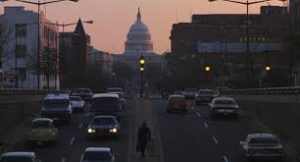
Based on the 1970 novel of the same name by Polish-born writer Jerzy Kosinski, the 1979 satirical-comedy Being There provided the great Peter Sellers with one of his final and very best roles. Sellers is Chance the gardener, a middle-aged simpleton who lives in the Washington townhouse of a wealthy old man (referred to as Jennings) and has never had any contact with the outside world. Chance depends entirely on the medium of television for his entertainment and edification. He lacks entirely in conceptual understanding and is limited to his observations on the weather, nature and gardening. When the housemaid Louise (Ruth Attaway) informs him that the ‘old man’ is ‘as dead as hell’ upstairs in his room, Chance thinks only to remark on the prospects of a snowfall. Upon seeing the deceased’s body – the man who effectively has been his benefactor all these years – Chance simply sits down by his bedside and channel-surfs on the TV. Referred to as ‘a little boy’ by the departing Louise, Chance is soon discovered by two partners from a law firm who are handling the estate – Thomas Franklin (David Clennon) and Sally Hayes (Fran Brill). The bemused couple enquire as to what Chance is still doing in the house and his exact relationship with Jennings. They inform the innocent one that essentially he does not exist; that there is no record of anyone having worked in the house since 1933. Chance, for his part, explains – as best he can – that he has been living there as long as he can remember and that he has never been allowed outside the house. He also mentions that he has never been in an automobile. When asked if he is related to the dead man, he replies that he doesn’t think so. Hayes and Franklin bluntly inform him that he must leave the premises by noon of the following day. To the strains of a jazzed-up version of Also Sprach Zarathustra, Chance duly dares to venture into the outside world for the very first time. It’s a rather shoddy, downtrodden environment as presented here by director Hal Ashby, no place surely for the child-like Chance. As if to confirm such an opinion, Chance innocently stops a lady on the street and asks her for a meal – ‘Excuse me, I’m very hungry, could you give me some lunch.’ Standing face to face with a group of aggressive youths, Chance asks if they can help him find a garden to work in. But there is no such garden and surely no place for Chance in this world we conclude. He is at odds with this strange and rather hostile environment. He has no understanding of how it operates.
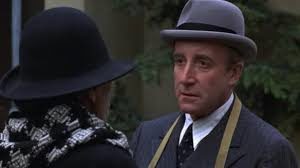
Chance then catches a break of sorts. Intrigued by his own image appearing on a television screen in a shop, he inadvertently puts himself in harm’s way and has his leg injured slightly by a reversing limousine. The occupant of the vehicle Eve Rand (Shirley MacLaine) insists that she take him to the hospital, but then decides to take him home instead. ‘This is just like TV except that you can see more,’ Chance remarks as they ride in the limousine. Eve mishears his name and begins calling him Chauncey Gardiner. This makes no difference to Chance whatsoever. The important thing for him is that he is being taken to another house; one where food and shelter will be provided; one where there is perhaps even a garden. There is an old man in this house also and he is Eve’s older husband Ben Rand (played by a superb Melvyn Douglas). Ben is terminally ill from what he describes as a ‘young person’s disease’, and is surrounded by machines, a team of nurses and his own personal physician, Dr. Robert Allenby (Richard Dysart). The good doctor recommends that Chauncey stay a few days as he, ‘might be a breath of fresh air.’ ‘He is different,’ an intrigued Eve comments as she agrees with this, ‘he’s quite intense.’ Chance meets Ben for the first time and over dinner describes how his, ‘house was shut down.’ Not for the last time in Being There, one of the supporting characters misinterprets Chance’s rudimentary words as Ben believes he is referring to a failed business. A highly successful man of enterprise and commerce himself, he implores Chauncey not to give up and not to talk about going to the ‘room upstairs.’ Chance, for his part, tells Ben that he would like to work in his garden. ‘I’m a very good gardener,’ he declares, but the other man does not realise he is referring to mere trees and shrubs.
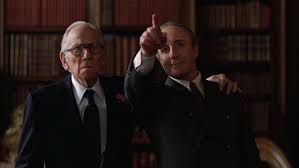
Determining to take Chauncey under his wing, the ailing multi-millionaire invites Chauncey to sit in on a meeting he is having with the President the next day. The character of the US leader is never named in the film and is played by Jack Warden (Shampoo, Heaven Can Wait). At first appearing confused by Chauncey’s over-familiarity, the President soon latches onto the gardener’s words about growth and how this may be stimulated. The viewer of course realises that Chance is not speaking in grandiose metaphors or allegorical rhymes, but the President and Ben think otherwise – ‘As long as the roots are not severed, all is well, and all will be well in the garden.’ When Chauncey states that, ‘There will be growth in the Spring,’ the President is suitably impressed and declares this to be, ‘one of the most refreshing and optimistic statements I’ve heard in a very long time.’ So much so that he quotes these very words of Chauncey’s in a speech given at the Financial Institute later that very same day. But, in spite of alluding to him as a man who has, ‘a feeling for this country that we need more of,’ the President also instructs his aides to find out more about Chauncey. It is evident that he is wary of this mysterious man who seems to have a quiet wisdom about him.
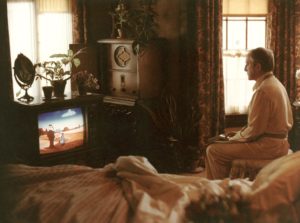
Much of the strength of Being There the novel and, indeed, Being There the film is the way in which the storytellers manage to sustain a premise which seems quite unlikely. How can all of these intelligent people be fooled by Chance we ask ourselves. The dimwitted fellow doesn’t even intend to deceive them. He simply doesn’t have the brainpower for such a ruse. The truth is that Chauncey appeals to the public and those around him because he speaks from the heart and has no overarching motivation. Invited to participate in a popular television chat show, Chauncey receives a favorable response from the audience and is lauded by the host for his, ‘down-to-earth philosophy.’ A newspaper journalist who seeks an interview with him deems him to be, ‘laconic’ and a man who, ‘keeps his cards close to his chest.’ Chauncey’s cult of appeal works for precisely the reason that he knows no better. He is not seeking power or office or any such thing, rather it is those around him who frame such possibilities around his persona. The fact that there is absolutely no background information pertaining to him raises him to the level of an enigma. Watching the recorded interview on a television set, a near-disbelieving Louise is one of the few who know the truth – ‘It’s for sure a white man’s world in America,’ she sardonically observes. Ben – one of the converted on the other hand – enthuses about Chauncey’s television performance – ‘You have the gift of being natural.’ It is this very gift, or rather innate disposition, which sells Chauncey to the public and those closest to him. Nearing the end of his own life, Ben even encourages Eve to get closer, intimate, with Chauncey. In one of two scenes in Being There which are somewhat out of kilter, a besotted Eve attempts to seduce Chauncey in his room. The latter isn’t just uninterested, he has no idea of what’s going on. He changes the channel on his TV set instead. This is the only appliance he needs and comprehends. Everything else is secondary as long as he can have this, tend the garden, and be certain of three square meals a day.
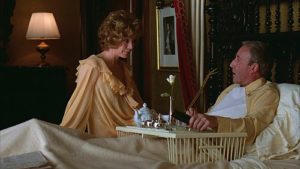
The President’s men draw a blank as to Chauncey’s past and can only determine that he wears hand-made suits which were tailor-made as far back as 1928. The investigating press also speculate as to, ‘Why they want to cover up his past.’ Of all his new friends and close associates, Dr. Allenby is the only one who begins to suspect the truth. Meeting with Franklin, he is told by the law partner how Chauncey had said he’d been living in Jennings’s house his whole life. Franklin himself is convinced that Chance is some sort of brilliant strategist, but Allenby has his private doubts as to this. The fad surrounding Chauncey knows no bounds, however, and it is alleged that he speaks eight languages and has a degree in medicine. The fact of the matter is that the backward gardener cannot even read or write. When offered a lucrative book deal, he tells the truth, but is once again misconstrued. When Eve visits his room once again and declares her innermost feelings for him, Chauncey tells her that he prefers to watch. He is referring to the television which is on as usual, but Eve confuses this for something else entirely. This is the second scene in Being There which doesn’t work as she attempts to perform for him on a bear-skin rug. MacLaine in fairness makes the best of it, but it’s a moment which Being There neither deserves nor needs. We understand that she is infatuated with the plain-speaking gentleman, it’s not necessary here to beat us over the head with the idea. Kosinski – who penned the adapted screenplay himself – may have included this in the original novel, but the resulting scene should have been excised from the film. It’s a minor quibble with an otherwise sharp and focused satire.
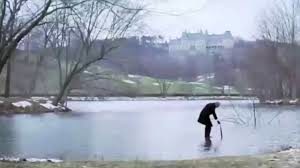
Being There will ultimately work for the viewer or fall entirely apart depending on one’s ability to suspend disbelief. It is something of a stretch to imagine that such a simple-minded individual could rise to such prominence, but, in this modern-age of ours, such a proposition is perhaps not as unthinkable as it might once have been. The aces in the pack here lie in the performances of the leads, particularly Sellers (who was Oscar-nominated for Chance/Chauncey) and Melvyn Douglas (who won his second Best Supporting Actor Oscar). When Being There was first published, author Kosinski received a curious telegram from his very own creation which read: ‘Available in my garden or outside of it.’ Kosinski dialed the accompanying number and Sellers answered at the other end. The star of films such as Lolita, Dr. Strangelove and the Pink Panther series had many triumphs in his life, but Chance/Chauncey was perhaps his crowning achievement. Shirley MacLaine as Eve fares fine too, as does Richard Dysart as Allenby. Following Ben’s death, the doctor confronts Chauncey with his own determination of the situation – ‘You really are a gardener, aren’t you?’ But such an understanding appears to matter very little as the pallbearers at Ben’s funeral discuss deposing the incumbent President and replacing him with a more universally- popular candidate. ‘Our one and only chance is Chauncey Gardiner,’ one of them is heard to say. Chance himself has roamed away from the proceedings and is seen moving through the snowy woods of the estate. In a much-discussed final image, he walks across a lake in a Christ-like fashion without sinking as the laws of gravity would decree. We hear the words of the President in an oration to Ben (‘Life is a state of mind’) as Ashby leaves us with this final ambivalent frame. Is there a suggestion that Chauncey is a Messiah of sorts? Is he capable of any such incredible act for the simple reason that he does not grasp its impossibility? These are questions which Ashby and Kosinsky present us with in this hugely satisfying allegory. There may well be a place for Chance in this world after all. Being There poses and sustains such a prospect, unlikely as it might be. It continues to have a keen relevance especially in our present era of populist politics and ready-made leaders.